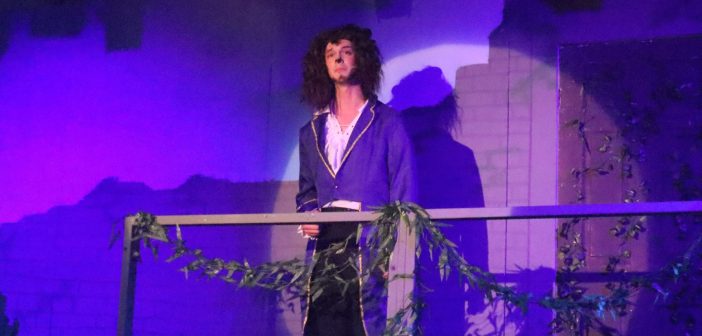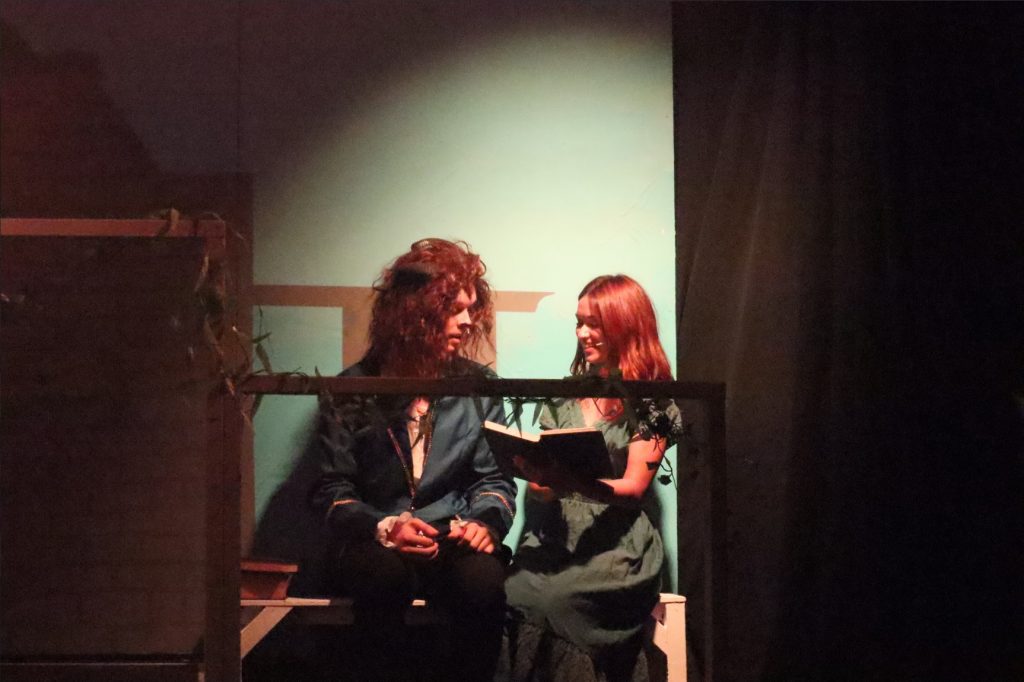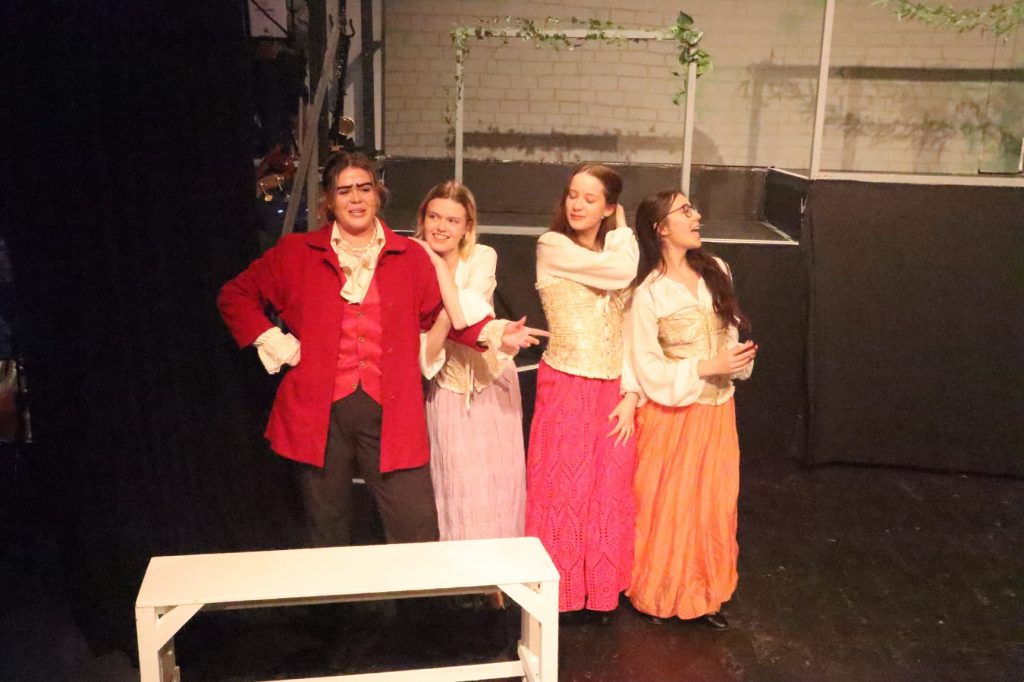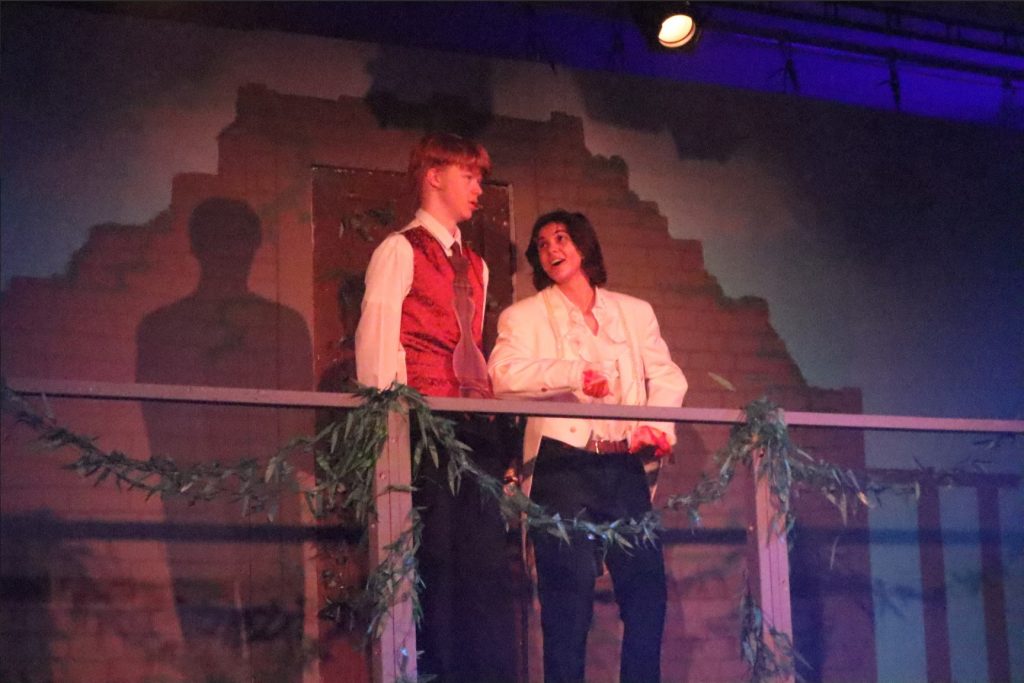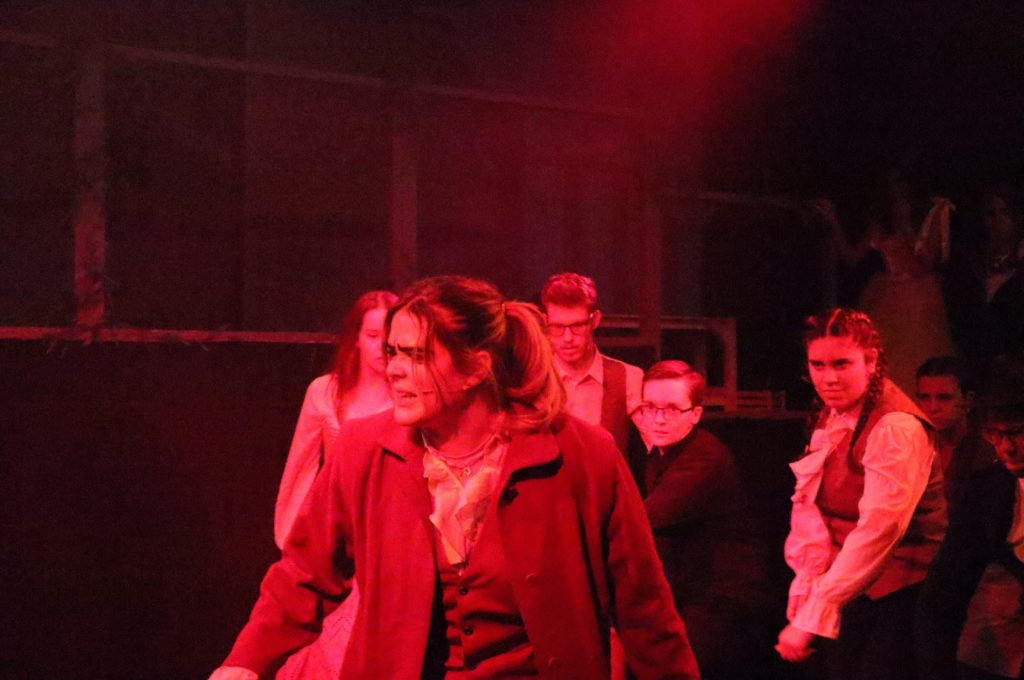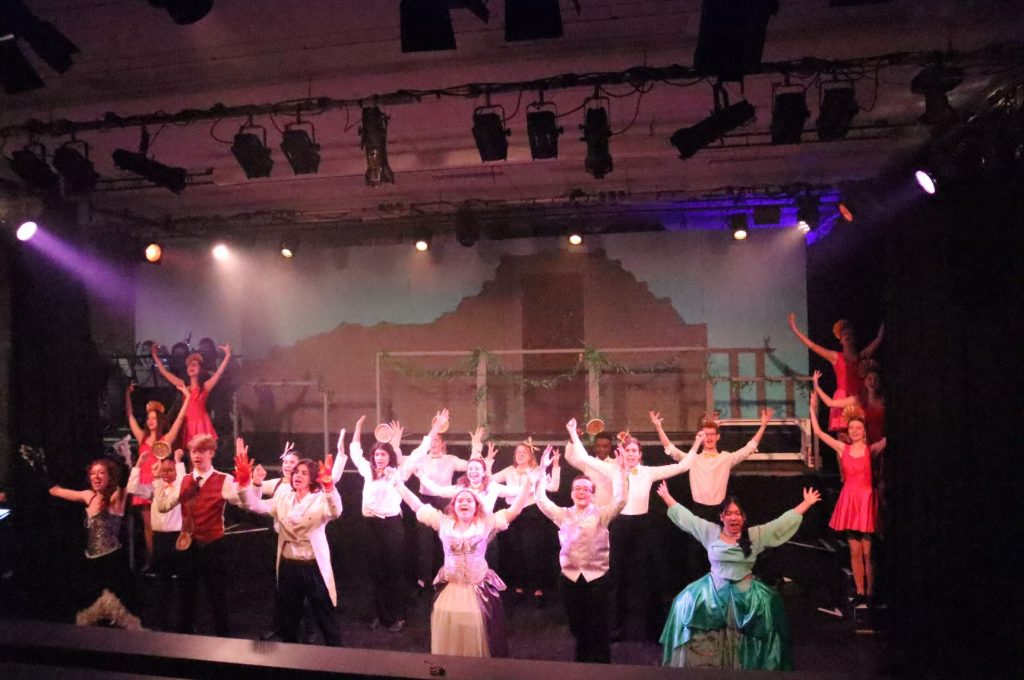Showstopper's latest musical brewed an intoxicating atmosphere filled with laughs, suspense, and brilliant performances.
Showstoppers kick start their year with their ‘Fresher’s Show’ – a cast full of those who haven’t yet acted for the society. They showcase this group of novices (or so they claim) with Beauty and the Beast, in a production that was as delightful, charming, fearsome and frightening as the title might suggest…
Beauty and the Beast (the musical) was Disney’s first stage musical production, first being shown in Houston in 1993 before its Broadway debut the following year. It is of course adapted from the 1991 animated Disney film Beauty and the Beast, and that in turn is adapted from the 1756 story that itself is an adaptation (for younger audiences) of the fairy-tale La Belle et la Bête, which, weirdly enough, translates to Beauty and the Beast. I have also read that La Belle et la Bête might not be the end of the chain, as the original fairy tale may yet be based on the true story of Petrus Gonsalvus, but this may be entirely based on the fact that this man lived before the fairy-tale and was quite hairy. It has also been claimed that the fairy tale is one of many versions of the base tale from the story of Cupid/Eros and Psyche, a decidedly less family-friendly adventure.
Showstoppers’ Beauty and the Beast luckily avoided these earlier influences. They opened with a stylish fairy-tale prologue accompanied by some beautiful music from the live band that would persist in its quality throughout. After the stage was set (narratively and physically), we were let into that all-important fantasy trope of the French peasant village doing French peasant things. I must first commend the costume department on some particularly commendable French peasant costumes. Even the French peasants were of note, all of them bustling around and making sure they had something to do, creating an all-important atmosphere that would prove to warm the audience to them greatly. I will say that a couple of the French peasants in the French peasant village looked a little lost, but it could well be that they were tourists: English peasants who had made their way to a French peasant village and were of course feeling out of place. While I’m on the subject, we were also treated to some French peasant choreography later on in the show, and a treat it certainly was.
Within the presumably complex social hierarchy of the French peasant village, the show’s main villain rose to the top – Gaston. The heavily eyebrowed champion of the French peasant village was played by the probably-a-voice actor Evie Warin. Evie brought an absurd amount of comedy to this would-be beast-slayer, quickly becoming an audience favourite with her powerful struts and her unblinkingly confident bicep curls. Her Gaston was hilarious in his lack of self-awareness, perfectly supported by the lavish praise lathered on by his ever-encouraging LeFou, played by Lilliana Waters. Both characters (and actors) made an excellent comedic team, with Evie’s enjoyable and engaging charisma backed up by Lilliana’s crackling energy as she deftly hit the beats of the bumbling sidekick. When pressed to take the lead in a song where LeFou hopes to restore Gaston’s mojo, Lilliana took the stage for herself and guided the French peasants to an inspiring song. It was definitely a highlight for the duo, allowing them to showcase their singing talents throughout. I had almost forgotten that Gaston was ultimately the scary villain of the story, but when it was time to take that role away from the Beast, Evie displayed another side to the character that I was surprised worked so well with the chad-like charm of Gaston’s Act One appearances. Supported by the strange, creepy, evil gravity of Jaxon Muiruri’s Monsieur D’Arque, Evie roused the French peasants with a sinister prowess and was really quite a terrifying mob leader. I do worry that Evie may actually be able to start a cult. Every cult leader needs the people to be cult-i-fied along though, and the rest of the cast cheered and roared in approval to add to the atmosphere the sinisterly lit stage was helping to create. It probably shouldn’t be surprising, given the pantomime-esque performance from Bella Brooks, Eleanor Tippey and Alex Barnett, playing three (presumably French peasant) girls that excitedly fawn over Gaston. Their performances alone were a reminder of how much good theatre is a team effort.
The French peasant costumes were good, but I was particularly impressed by the costumes of the household staff. These showed clear reference to the objects these characters were supposed to be on stage and enhanced the characterisation without taking away from the actors’ performances. The production team shied away from making a full cardboard clock costume for Cogsworth or getting Lumière to hold a candle in each hand, instead allowing the actors to fully immerse themselves in the characters and not have to worry about clunky costumes. To use Lumière as an example, the miraculous talking candelabra was adorned with some glittery, sparkling fingers instead of full-on candles. Not only does this free up an actor’s performance (and stop hot wax searing down their arms), but the sparkling fingers particularly suited this production’s suave and energetic Lumière, and it’s the same story for the rest of the household staff as well.
Speaking of the household staff, their chemistry, charm and homeliness warmed the entire audience to affection as they welcomed (for the most part) Belle into the castle and desperately tried to warm her to the Beast. Perhaps the most welcoming was the fantastic Lillian Strickland as Mrs Potts, who brought a massive amount of unflinching and unfaltering character to her performance. Her vocal performance during the dialogue was matched during the songs as she managed to keep the vocal characteristics of Mrs Potts present in some beautiful singing. Lillian brought an older and more motherly personality to the group dynamic and was an unexpected highlight to the show. A mother needs a child, and a teapot needs a teacup, and Ali Treanor had such a wonderful innocent energy as Chip. I will talk about this a little more at the end, but it’s clear the audience’s hearts were softened and then melted by their child-like sweetness – an even more impressive feat as Ali is, in fact, the oldest member of the cast.
I was not expecting to love the wonderful duo of Alyssa Kakoullis’s Lumière and Ben Brandworth-Fiander’s Cogsworth as much as I did. Their chemistry as the laid-back candelabra and the by-the-book clock felt like the warm, charming, hilarious heart of the musical. Their physical performances were brilliant foils to one another, with Alyssa giving such an effortlessly smooth and physically energetic performance, while Ben’s Cogsworth was more stiff and suspicious, striding about the castle like he thought he was single-handedly responsible for making sure it didn’t spontaneously combust. Alyssa brought an alarming amount of undeniable charm that I hope all future Lumières try to replicate, and their French accent was impressively consistent. Ben’s Cogsworth was a more youthful character than he usually is, but I found that it added a real depth to the loyal servant of the castle as he tried to keep order with this diverse set of fun characters. Their interactions as lifelong friends were completely wonderful and I would totally watch a spin-off with Lumière trying to throw lavish feasts and Cogsworth fretting over the chaos they might cause.
Amy Black’s flirtatious, lively Babette had a confidence and assurance to her that made a ticklingly funny match with many other characters, whether it was the astonished Maurice or the uncomfortable Cogsworth, Amy was excellent at bouncing off other performances to enhance her own. A similarly self-confident piece of household equipment was Vanessa Tan’s Madame de la Grande Bouche, who carried a haughty presence around along with a rather massive green dress. The household staff came together in the musical highlight of the show – ‘Be Our Guest’, giving the actors a chance to showcase their fabulous singing and dancing talents rather superbly. This was, I felt, where the choreography (done by Lily Ong and Emily Holland) had the biggest time to shine, and it felt like everyone was pulling out all the stops as they put on a show for Belle and the audience. The audience’s excitement built throughout the number and we were treated with a dance of Lumière and Babette, featuring an epic lift that looked completely effortless. It was entertaining to see Cogsworth lose more and more control as more of the ensemble joined in to add to the show. I must compliment the ensemble themselves on an energetic performance, whether at the front or back. The show had a fairly large ensemble altogether, seven as pure ensemble members (Leon Muriuki, Emma Likeman, Grace Taylor, Maya Whyte, Matthew Waddington, Neophyta Neophytou and Emily Goring), with many other cast members (naturally) coming to fill the ranks when needed as well. Lily and Emily should be proud of bringing together such a large group and making the dances varied and interesting throughout, especially in such a small space. Directors Nora Shields and Cerys May should similarly be praised for making sure the ensemble actors all worked together to liven the scenes they were in. As mentioned before, Gaston’s speech to the roused and ready-to-fight villagers was a particular favourite scene of mine.
The core component of the musical is of course its titular characters. We’re introduced to Chelsea Gamble’s Belle amidst a sea of panto-esque characters, and she seems to be the only one with a realistic look at things. Chelsea held herself with a protagonist’s surety and opened with the singing voice of a true Disney princess. I’ve been listening to the soundtrack while writing this review, and I’m not sure I can really tell the difference between Chelsea’s singing and that on the official Broadway soundtrack. She was a fantastic Belle, whether she had to be sweet, sassy or steadfast. Her relationship with her father, Nas Paul’s Maurice, was a showcase of beautiful character work from both of them and helped the audience warm to them very early on. Nas quickly switched from hopeless to excited, insular then outwardly caring, showing all the emotional range and inconsistency of a mad old inventor who loves his daughter. Belle’s emotional journey, and Chelsea’s range within the character, were most impressively shown off as her attitude to the Beast changed. The quality of her performance never dropped once, and the consistency of her character flowed beautifully (wheyup) throughout. There’s a fair amount of stage time dedicated to just Belle and the Beast, but all of these scenes felt varied and energetic in their performance, even the ones that were slower-paced. Ben Mansell’s Beast began with a beautiful mixture of ashamed, angry, bitter, and socially inept. Ben’s powerful, intimidating voice, along with the choice not to immediately show him to the audience and keep him under darker lighting, gave the Beast a very real sense of intimidation. The band’s creepy music; Ben’s deep, angry growls; and Nas and Chelsea’s fear in one particular scene sent shivers down my spine as I found I was completely immersed in the mystery and performance. Ben’s emotional transformation, preceding his physical one of course, was a joy to watch, as the Beast became physically more responsive and open to the other characters on stage. He proved to be as adept at the emotional side of the Beast as he was its fearsome side, acting with a sublime subtlety and singing with a magnificent emotional timbre.
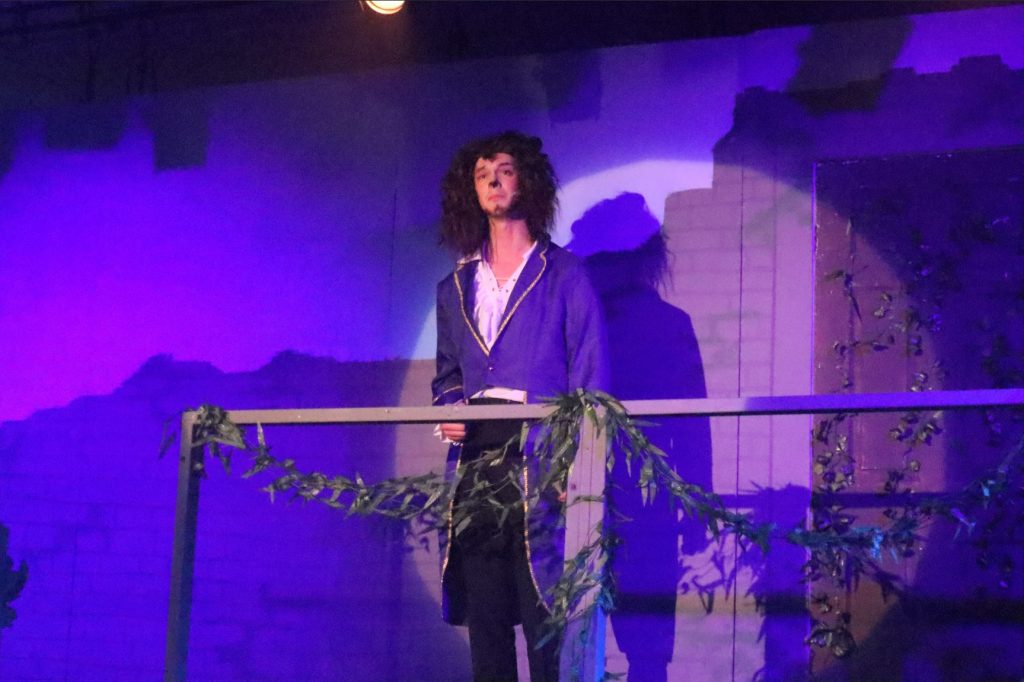
‘Man dressed as a beast stands on the balcony with a light shined at him and looks upset’
Photo credit: SUSU Showstoppers
All of this acting, singing and dancing prowess was enhanced significantly by the varied and clever use of lighting on stage. Technical Director Sasha Kavanagh must be commended on running a tight ship with the rest of Stage Soc’s tech crew. I must also commend whatever Stage Soc member had the dedication to fully dive and slide underneath the set. I hope Sasha and the team take an immense amount of pride from their success with Beauty and the Beast, as they did an incredible job.
For me, the music is a massive part of creating an atmosphere onstage, or on screen. Musical Directors James Warner and Toby Walden built the cast up to sound fantastic, and I only wish there were more occasions where they sang as a full troupe. It was clear that James and Toby had worked hard to instil the all-important confidence within the cast, but a similar respect must be shown to the band. To cobble together a student group for a band pit in a musical is an achievement in itself, but this was one of, if not the, best bands I have heard in a university production. They sounded fantastic and professional throughout and were an important part of the show’s success.
Nora and Cerys pulled all these different elements of the musical into a complex net of accomplishment. The biggest proof of this was the audience’s reception on the night I went to see the show. I’ve talked a little about the audience throughout this review, mostly referencing how certain elements of the performance led to them warming to the characters and story. Not to insult anyone there (as I was, in fact, there), but the audience wasn’t the most receptive to begin with. I have the excuse of constantly writing notes, but there seems to have been a very British lull to the musical theatre spirit to begin with. Polite, and genuine, applause, yes, but whoops, gasps, laughs and unholy screeching were somewhat muted during the first couple of songs.
But…
You wouldn’t have known that by the end. They were practically cheering before the songs were over and they were so keen to give a standing ovation, I’m surprised no one fell over. One person in front of me stood up a little too early and had to sit back down. The charming, lively, playful atmosphere that characterised much of the show put the audience very much at ease as it welcomed them to take their coats off and sit down to appreciate the entertainment. Every scene carried an air of excitement, but the most obvious moment of audience love was when Ali’s Chip came on stage after becoming human again. There was, I kid you not, a genuine, breathy, quiet ‘awwww’ that rippled across the audience. Winning over a difficult audience that quickly and completely should be, in my humble opinion, the cast and crew’s biggest pride. They have all proved that the future of Showstoppers, and musical theatre at Southampton, is in good hands.

